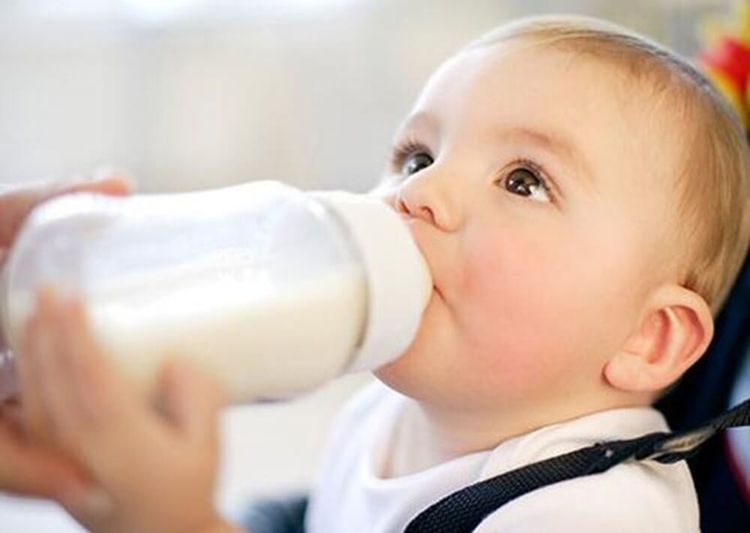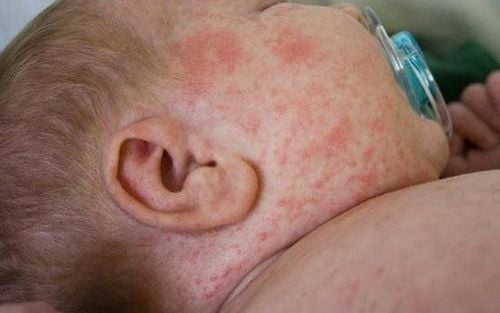Specialist Doctor Nguyen Huu Nam, a pediatrician and neonatologist at the pediatrics and neonatology department at Vinmec Nha Trang International General Hospital, provided expert consultation on the article.
Enough milk must be given daily to newborns and young children in order to promote their overall physical and mental development. Nevertheless, mothers are concerned about ensuring their kids have enough milk each day. Mothers can learn how to determine how much milk their infants should consume daily based on their weight by reading the following article.
1. Why do newborns need to drink enough milk every day?
Breast milk is the most essential nutrition source for young children's development, especially newborns. However, the amount of milk given to children daily also plays a significant role. Too much milk makes children susceptible to overweight, obesity, and digestive problems such as diarrhea, bloating, etc. On the contrary, too little milk will make children gain weight slowly, and if prolonged, it will lead to rickets and malnutrition. Weak physical condition makes children susceptible to illness and diseases caused by external pathogens. In addition, too little milk given to children every day is also the cause of slowing down the intellectual development of children; their cognitive and learning abilities are seriously impaired, and their motor skills develop more slowly than their peers. Therefore, the amount of milk given to newborns every day needs to be sufficient and in the right amount to ensure comprehensive physical and mental development.
2. How do you know if your baby is not getting enough milk?
Some signs that help mothers know if their baby is not getting enough milk are as follows:
2.1. The baby is feeding too short or too long
The amount of milk needed and the feeding time of each baby will vary depending on each stage of development. However, each newborn usually has a feeding time of about 10 - 20 minutes. Therefore, if the baby is feeding for less than 10 minutes, the baby may not have enough milk. The time between feedings is longer than 3 hours, which is also a sign that the baby is not getting enough milk.
2.2. A gradual increase in weight
One of the most obvious indicators that a baby is not getting enough milk is slow weight gain. According to studies, a newborn's weight tends to fall throughout the first week of life since they frequently lose physiological weight. However, if the baby does not increase or even lose weight after the second week, it could be because they are not getting enough milk.
Mothers can determine if the baby's weight satisfies the standards based on the typical weight of children at each stage. Newborns will therefore begin to gain weight quickly in the second week, increasing by roughly 1 to 1.2 kg every month. Physiological anorexia, the child's illness, and other factors can cause the increase to fluctuate. Nevertheless, if the baby gains weight too slowly or loses weight, the mother needs to pay attention to the case of the baby not drinking enough.

2.3. Too few wet diapers, dirty diapers during the day
One of the simple ways to help mothers control the amount of milk their baby takes in each day is to count the number of wet diapers and dirty diapers the baby changes each day. Accordingly, a newborn baby needs to change an average of 6 diapers each day. However, mothers do not need to worry too much during the first days of birth; the baby only wets 1-2 diapers daily because this is when the baby receives nutritious colostrum. After the colostrum is gone, the baby will start to urinate more.
2.4. Insufficient Lactation
Studies have demonstrated a remarkable physiological connection between maternal physiology and the infant’s suckling mechanism. This connection ensures that the mother’s body produces an adequate amount of milk, including colostrum, to meet the infant’s nutritional demands. If a mother observes a reduction in milk production within a day, it may indicate that the infant has not been adequately breastfed during previous feedings.
Additionally, several clinical signs can help mothers identify whether their infant is underfed. These include increased irritability, frequent hand-sucking, rooting behavior (turning the head to seek the breast), opening the mouth widely, and lip-smacking, among others. Early breastfeeding practices are crucial to ensure the infant receives colostrum, which provides vital immunological and nutritional benefits.
3. How do you know if a newborn is getting enough milk?
One of the signs that helps mothers know that their baby is getting enough milk is remembering the baby's feeding schedule. About 2-3 hours for newborns is equivalent to 8-12 times/day. When the baby is breastfeeding, you will notice that milk comes out evenly in the baby's mouth and hear the baby sucking. When the baby gets enough milk, the baby usually urinates 6-8 times a day, and the urine is odorless and light yellow. In the first few weeks after birth, the baby usually defecates twice a day, with the characteristics of stools changing from meconium to yellow or green or from yellow to a more liquid form.
When the baby's milk supply is sufficient, the baby will be happy and automatically release the nipple after each feeding. Also, the baby getting enough milk has a weight within the standard weight range, white and healthy skin, and both weight and height are standard.
4. How to calculate the amount of milk for newborns
To supplement enough milk for your child each day, mothers need to understand and know how to calculate the amount of milk for newborns. Research results show that mothers can base on the formula to calculate the amount of milk for their children as follows:
- The minimum amount of milk a baby drinks daily depends on the weight and is calculated by the formula 150ml multiplied by the child's current weight. For example, if a baby weighs 4.9kg, the milk a baby drinks daily is 4.9 x 150ml = 740ml; on average, every 3 hours, the baby drinks about 92ml. Furthermore, to avoid the baby spitting up milk due to drinking too much, the mother should let the baby rest after drinking half the milk.
- For newborns, the amount of milk for the baby each day can be calculated as follows: Newborns in the first days can only hold a small amount of milk in each feeding. The amount of milk the baby drinks will increase to 30ml per time. In the first week after birth, a baby can drink 60ml of milk per feeding. At 1-2 months old, the baby can drink 90-120ml of milk per feeding with 4-5 daily feedings. At 6-12 months old, the baby can drink 180-240ml of milk per feeding with 3-4 feedings per day because, at this age, the baby has started eating solid foods.
However, the formulas for calculating the amount of milk for newborns above are only general because the amount of milk for babies to drink each day also depends on the eating level of each child, and during the stages of intense development, babies can drink more milk than usual within 2-3 days.

5. Is the amount of milk babies drink daily different from breast milk and formula milk?
Research from experts has shown that the amount of milk babies need to drink each day is different depending on whether the baby is formula-fed or breastfed. Accordingly, formula-fed babies need more milk than breast milk because the formula is fed by a bottle with a steady flow of milk, and babies tend to drink more milk.
6. What are the consequences of not calculating the amount of milk for babies each day?
Not knowing how to calculate the amount of milk for newborns is one of the reasons why mothers do not know whether their babies are whole or not, leading to anxiety, creating pressure on mothers to raise children, and quickly encountering stress. To relieve the above problems, mothers often force their children to eat more by all means.
One of the ways mothers feed their children more is to force them to drink more milk by using spoons, cups, breast pumps, and so on. These ways inadvertently create a panic mentality for children every time they eat and drink, a situation that, if prolonged, can lead to consequences such as slow development and slow weight gain... In addition, in some stages of development, children may have physiological anorexia. Suppose mothers do not carefully research the condition. In that case, they may make the mistake of forcing their children to eat when they do not want to eat, causing physiological anorexia to become pathological anorexia.
To arrange an appointment, please call HOTLINE or make your reservation directly HERE. You may also download the MyVinmec app to schedule appointments faster and manage your reservations more conveniently.













